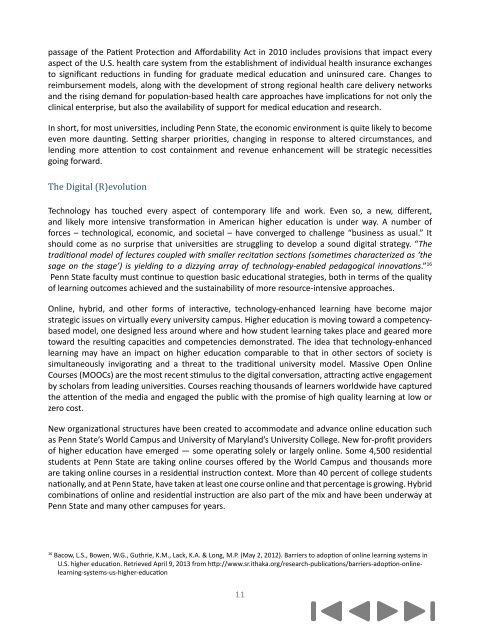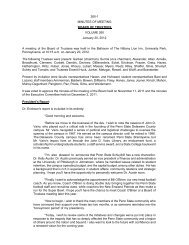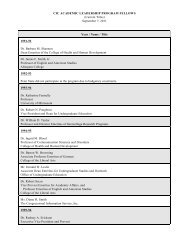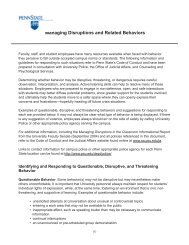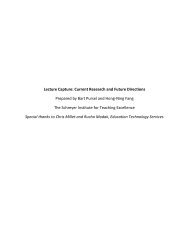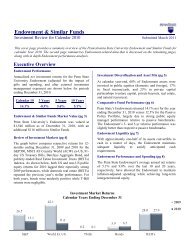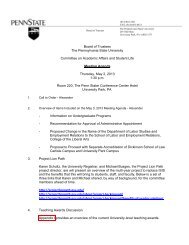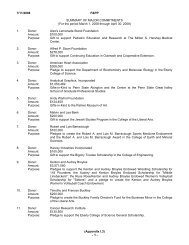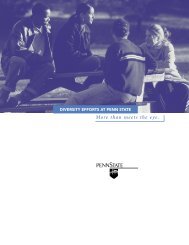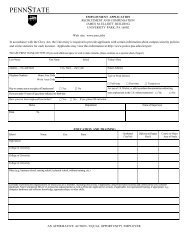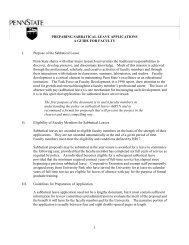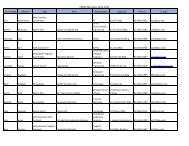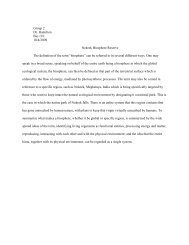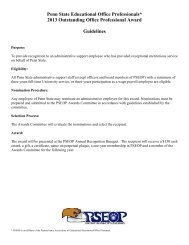A VISION FOR PENN STATE - Penn State University
A VISION FOR PENN STATE - Penn State University
A VISION FOR PENN STATE - Penn State University
You also want an ePaper? Increase the reach of your titles
YUMPU automatically turns print PDFs into web optimized ePapers that Google loves.
passage of the Patient Protection and Affordability Act in 2010 includes provisions that impact every<br />
aspect of the U.S. health care system from the establishment of individual health insurance exchanges<br />
to significant reductions in funding for graduate medical education and uninsured care. Changes to<br />
reimbursement models, along with the development of strong regional health care delivery networks<br />
and the rising demand for population-based health care approaches have implications for not only the<br />
clinical enterprise, but also the availability of support for medical education and research.<br />
In short, for most universities, including <strong>Penn</strong> <strong>State</strong>, the economic environment is quite likely to become<br />
even more daunting. Setting sharper priorities, changing in response to altered circumstances, and<br />
lending more attention to cost containment and revenue enhancement will be strategic necessities<br />
going forward.<br />
The Digital (R)evolution<br />
Technology has touched every aspect of contemporary life and work. Even so, a new, different,<br />
and likely more intensive transformation in American higher education is under way. A number of<br />
forces – technological, economic, and societal – have converged to challenge “business as usual.” It<br />
should come as no surprise that universities are struggling to develop a sound digital strategy. “The<br />
traditional model of lectures coupled with smaller recitation sections (sometimes characterized as ‘the<br />
sage on the stage’) is yielding to a dizzying array of technology-enabled pedagogical innovations.” 16<br />
<strong>Penn</strong> <strong>State</strong> faculty must continue to question basic educational strategies, both in terms of the quality<br />
of learning outcomes achieved and the sustainability of more resource-intensive approaches.<br />
Online, hybrid, and other forms of interactive, technology-enhanced learning have become major<br />
strategic issues on virtually every university campus. Higher education is moving toward a competencybased<br />
model, one designed less around where and how student learning takes place and geared more<br />
toward the resulting capacities and competencies demonstrated. The idea that technology-enhanced<br />
learning may have an impact on higher education comparable to that in other sectors of society is<br />
simultaneously invigorating and a threat to the traditional university model. Massive Open Online<br />
Courses (MOOCs) are the most recent stimulus to the digital conversation, attracting active engagement<br />
by scholars from leading universities. Courses reaching thousands of learners worldwide have captured<br />
the attention of the media and engaged the public with the promise of high quality learning at low or<br />
zero cost.<br />
New organizational structures have been created to accommodate and advance online education such<br />
as <strong>Penn</strong> <strong>State</strong>’s World Campus and <strong>University</strong> of Maryland’s <strong>University</strong> College. New for-profit providers<br />
of higher education have emerged — some operating solely or largely online. Some 4,500 residential<br />
students at <strong>Penn</strong> <strong>State</strong> are taking online courses offered by the World Campus and thousands more<br />
are taking online courses in a residential instruction context. More than 40 percent of college students<br />
nationally, and at <strong>Penn</strong> <strong>State</strong>, have taken at least one course online and that percentage is growing. Hybrid<br />
combinations of online and residential instruction are also part of the mix and have been underway at<br />
<strong>Penn</strong> <strong>State</strong> and many other campuses for years.<br />
16<br />
Bacow, L.S., Bowen, W.G., Guthrie, K.M., Lack, K.A. & Long, M.P. (May 2, 2012). Barriers to adoption of online learning systems in<br />
U.S. higher education. Retrieved April 9, 2013 from http://www.sr.ithaka.org/research-publications/barriers-adoption-onlinelearning-systems-us-higher-education<br />
11


